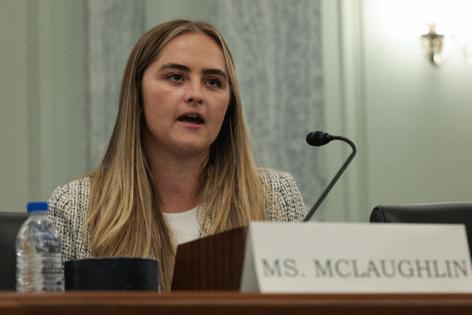Faster, higher, stronger? Senators probe anti-doping group ahead of LA Games.
Published in Olympics
WASHINGTON — Senators demanded the straight dope on performance-enhancing drugs at a hearing this week, ahead of major sporting events coming to the U.S.
Next year the country will co-host the World Cup with Canada and Mexico, and the 2028 Summer Olympics are headed to Los Angeles. Looking further ahead, Salt Lake City is on tap to host the Winter Olympics in 2034.
But first, lawmakers on Tuesday probed the international group that aims to keep sports free from doping.
“What exactly are they hiding?” asked Marsha Blackburn, R-Tenn., who chairs the Senate Commerce Subcommittee on Consumer Protection, Technology and Data Privacy. “The U.S. is WADA’s largest financial contributor. … Yet WADA has treated our concerns with disdain and its athletes with disrespect.”
Blackburn said the World Anti-Doping Agency refused to appear before the panel. She accused it of failing to investigate claims that Chinese swimmers tested positive for banned substances ahead of the Tokyo Olympics in 2021.
In January, the Biden administration announced it withheld $3.6 million in dues to the group.
Amid inflamed partisan tensions across the nation, Tuesday’s hearing was a rare moment of patriotic comity on the Hill.
“We should not let WADA misconduct cause the next Olympic games to rob another member of Team USA from their rightful place on a podium,” said ranking member John Hickenlooper, D-Colo. “WADA must increase transparency in its investigations and regain the athletic community’s trust.”
Blackburn reintroduced a bipartisan, bicameral proposal earlier this year that would allow the administration’s Office of National Drug Control Policy to further withhold dues from WADA to pressure the organization into adopting governance reforms.
The witnesses Tuesday included a doctor, a lawyer and an Olympic swimmer.
“At the end of the day, it’s about the people. It’s about the pride, sacrifice and integrity,” said Katie McLaughlin, a member of the U.S. women’s swim team at the Tokyo Summer Games. “It should never have to be a question about whether the playing field was level.”
McLaughlin and her teammates won silver in the 200-meter freestyle relay, falling 0.4 seconds behind China. McLaughlin said hearing athletes might have cheated “stung more” than when injury kept her out of the 2016 Olympics.
“We need transparency in decision-making through conflict-of-interest protection, independent oversight, and a permanent U.S. seat at the table,” said Rahul Gupta, a former director of the national drug policy office. “WADA leaders responded by removing us from its executive committee, and that’s not because we broke rules, but because we dared to challenge a broken system.”
“WADA remains far too tethered to the International Olympic Committee and international sport powers,” testified Dionne Koller, a professor at the University of Baltimore School of Law and former co-chair of the Commission on the State of U.S. Olympics and Paralympics. She said change is needed to honor the principles of the Convention Against Doping in Sport.
While the U.S. has its own sordid history with doping scandals, pushing to make its anti-doping efforts independent from sport governing bodies helped to clean up America’s act, the experts testified.
Now, WADA should follow suit, they agreed. “I truly believe independence is the silver bullet,” U.S. Anti-Doping Agency CEO Travis Tygart said.
©2025 CQ-Roll Call, Inc., All Rights Reserved. Visit cqrollcall.com. Distributed by Tribune Content Agency, LLC.







Comments